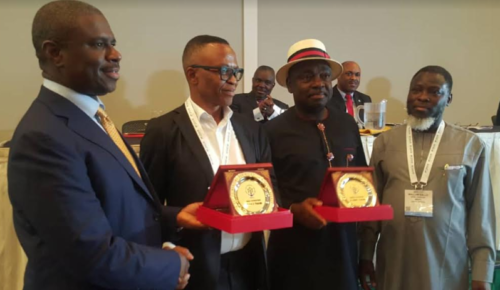
The Nigerian Maritime Administration and Safety Agency (NIMASA) has expressed its readiness to develop policies that will see to a smooth transition from the regime of intense wet cargo operations, which is the major source of income for the maritime sector in Nigeria, to the inevitable era of renewable energy which may see less activities in crude oil exploration and exploitation in the country.
The Director General of NIMASA, Dakuku Peterside, stated this when delivering a paper at the Africa Regional Workshop with the theme, the effect of Global Energy Transformation at one of the side workshops during the just concluded Offshore Technology Conference in Houston, Texas.
Peterside noted that though, the maritime sector in Nigeria benefitted extensively from oil exploration and exploitation in Nigeria including limited technological and skill transfer, the time to see both opportunities and associated risk of the gradual shift towards renewable energy from fossil fuel for the maritime sector is now.
He said that there might be no need for huge vessels, for intercontinental shipment of both crude and refined products in years to come, thus the need for a new logistics dynamics to bring about logistics diversification.
“We at NIMASA are working to create a new framework to maximize opportunities provided by renewable energy. So the world does not leave us behind. As a Maritime Administration we are taking conscious steps to put the necessary building blocks for an era of renewable energy when exploration and exploitation of oil and gas and all associated logistics will no longer play a major role. We propose policies to promote transition to clean and renewable energy. We have accepted the inevitability of renewable energy in years to come,” he said.
“As government and a people, we must begin to invest in research. We must invest in quality tailor made education for a future without much income from fossil fuel and focused mainly on harnessing potentials of renewable energy which are abound in our country,” he said,
He also disclosed that partnership with other agencies of government to undertake research and project into the immediate and long term future of the maritime industry in Nigeria is part of NIMASA preparation for the future with less income from exploration and exploitation of the oil and gas sector. He noted that the need for Very Large Crude Carriers (VLCCs) amongst others would reduce, thus the need to guide investments in the Nigerian maritime sector.
“Our partnership with the Nigerian Content Development and Monitoring Board to identify the types of vessels that Nigerian should acquire in order to guarantee good business and return on investment in the immediate and long term is part of our focus on the future. We are investing in research to determine the opportunities and threats that will come with the inevitable shift from fossil fuel to renewable energy,” he added.